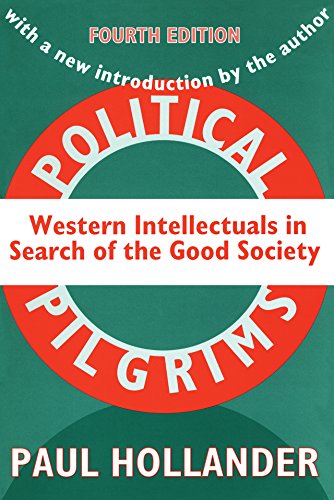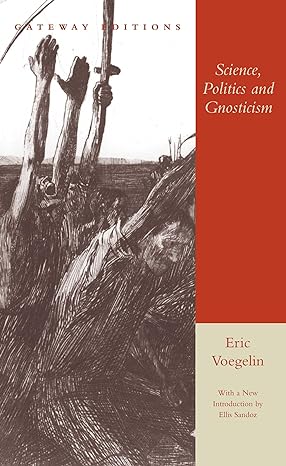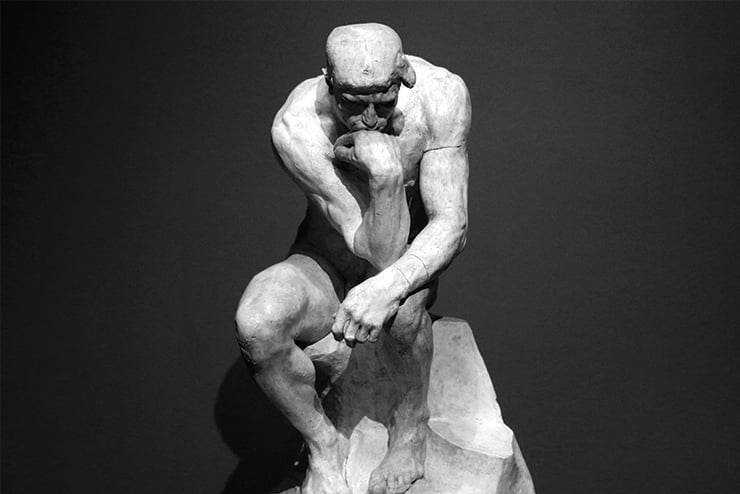The Intellectual Classes and the Gnostic Revolution
He is a thinker: that means he knows how to make things
simpler than they are.
—Friedrich Nietzsche, The Gay Science
Nietzsche’s meaning here is open-ended regarding the intellectual as human being. To make things simpler is a good, even necessary, activity in human life. In this sense, we are all thinkers. In our daily lives, we turn the endlessly varied and nearly infinite array of events and perceptions into something manageable and amenable to a practical trajectory throughout the day.
But, of course, simplification can also be motivated by something other than the practical necessities of life. Thinkers can sometimes make complex matters less complex for the underhanded purpose of omitting details inconvenient to an agenda they want to advance. In our time, evidence of intellectuals simplifying in order to distort is easy to find. Indeed, something about the situation of the intellectual in our time has increased this probability.
The chief problem with intellectuals in our time can be summarized in a dilemma. It cannot be seriously posited that we could do without intellectuals and their expertise entirely or in all domains. If we want technologies to function and systems of many types—medical and economic, just to name two—to operate to our mutual benefit, we will need intellectuals to spend long years in expert training. At the same time, though, we must always be vigilant about how their work in those specialized domains can result in them claiming authority or exercising power in other domains without special qualifications for decision-making or action.
Especially regarding the practical matters of the organization and governance of a society, there is no guarantee that the intellectual’s greater immersion in the world of abstraction and ideas will lead him to a position of greater wisdom than the average citizen. Some evidence even suggests the intellectual classes might be especially vulnerable to a variety of serious self-deceptions in this regard.

The social characteristics of the intellectual classes are alienation, aggressive secularism, progressive politics, and overweening self-confidence. Intellectuals are remarkably monolithic in their values and politics. They are also exceedingly socially uniform, notwithstanding their nearly unanimous embrace of the now-dominant rhetoric of diversity in American institutions.
The kind of people who spend long years in institutions of education tend to be well-off economically. They come from segments of the population that skew heavily secular and liberal culturally. Lengthy stays within the confines of the formal educational system that, since the 1970s, has tilted significantly leftward tend to further shift their ideological bent. Those who have spent much of their lives in social environments where people are culturally similar and who therefore find it easy to get along are prone to see progressive values as axiomatically true. From their perspective, if nonintellecuals could just be “reasonable”—that is, adhere to progressive, secular values—then they will find it a simple matter to avoid the evils of conflict, hierarchy, and domination.
The intellectual classes are also alienated from the society surrounding them and from many of its core values. Their academic degrees symbolize membership in a culture that distinguishes its practitioners from the rest of the society in which they live. They believe reasoned debate and consideration of evidence always determine what society holds to be true. All claims that cannot stand against the compulsion of the facts—for example, any allegiance to a community based simply on emotional attachments to the community of one’s fathers—must be swept away. The intellectual classes are emotionally attached to no place and no one in particular. They prefer theoretical idealizations to the messiness of the real. They are, in the language David Goodhart has popularized, “anywhere people,” to be contrasted with the “somewhere people,” who remain attached to real, concrete places and persons.
The alienation of the intellectual class follows from its own high evaluation of the value of its work and the fact that the society in which it finds itself does not reward professional thinkers with the highest status. They feel they deserve more than they get and blame the prevailing social order around them for their perceived maltreatment. Thus they distance themselves ideologically from the social order. In Paul Hollander’s splendid study of Western intellectuals who are sympathizers with Communist and totalitarian governments, Political Pilgrims, we see abundant evidence of the attraction of the alienated Western thinking classes to societies in which they imagine theory and theorists are given proper respect.

Such relative deprivation can, in some situations, even predict the greater adherence members of the thinking classes may have to revolutionary ideologies that promise the shake-up of an intolerable status quo. Numerous French social scientists endeavored to explain the near-revolutionary events of May 1968 in France by citing the professional blockage of intellectuals. Too many scholarly position-holders were produced in intellectual fields with decreasing numbers of professional positions available for them. Whenever and wherever this situation occurs, it is bound to cause problems for social order since virtually every member of this blocked intellectual class can dream up his own revolutionary philosophy.
The progressivism and the secularism of the thinking classes go hand-in-hand with their alienation. These traits, too, stem from the functions of intellectuals and their overestimation of their value and contributions to the world.
Though intellectuals spend more time in the rational pursuit of knowledge, the realm of knowledge is not the unique playing field of intellectuals. Some classes rely more on other means of establishing knowledge about the world—the less-educated and the highly religious rely on traditional knowledge handed down from authoritative sources, for example. Charismatic leaders and successful businessmen acquire practical knowledge from the trial and error of experience and are given great deference by the middle classes who want to emulate their material achievements.
But these competing authority figures are seen by intellectuals as inferiors who are at the mercy of irrationality. Rather than through obedience to tradition or hard-won experience, they prefer truths to be meticulously reasoned out by those properly trained to patiently do the intellectual work; a priori foundations are simply not needed. Thought itself can find the perfect solutions to all problems, so long as it is wholly unburdened of the prejudices of unreason.
The intellectual classes, finally, are inveterately secularist. In the rare cases where they cultivate religious ideals, they are almost certain to be progressive and in opposition to tradition. The survey data show that those in the intellectual classes adhere to established religious belief systems at significantly lower rates than other members of their societies.
But how secular are the intellectuals, really, as a practical matter? The human need for transcendent moral systems runs too deep to be discarded as we are educated away from our spiritual origins. Even in hunter-gatherer groups with non-universal religious systems, there is always a clear consensus that the best moral system possible is the one to which they adhere. This is a de facto recognition of universalism without the practical application of proselytization.
Naturalistic science can even make a case for the utility, if not necessarily the inevitability, of religion. From the standpoint of natural selection, something that could produce the kind of selfless cooperation human societies frequently require may well be advantageous in an evolutionary sense. It benefits all members of a social group to adhere to a moral system that provides them a compelling narrative about laying aside their narrow interests, at least sometimes, to perform altruistic acts that benefit other group members. Religions, which base that narrative on some external source of authority, are particularly compelling examples of such natural cooperative systems.
Intellectuals are like other social groups insofar as they are interested in acquiring what they want and in exercising power. All humans, intellectual and nonintellectual alike, feel pressure to engage in collective moral systems of altruistic self-sacrifice. Because of their abstraction from real life, intellectuals are more prone to utopian and overly abstract, rationalistic thinking than other social groups. Thus, it’s highly likely that societies with large intellectual classes will see the emergence of rigorously utopian moral systems that privilege the interests of the intellectual classes.
The story of the purportedly secular intellectuals under communist governments is a strong case study. Hollander has shown how the quasi-religion of Marxism operated in their moral consciousness in virtually every way scholars recognize as constituting religious practice. The discourse of the communist thinkers contains many religious elements:
- stringent moral binaries of good (communism) and evil (capitalism)
- “holy” figures (Marx/Lenin/Stalin/Mao/Che)
- “holy” events (the revolutions of 1917, 1949, and 1959)
- and an eschatology directing the end of history to a promised land.
Think, too, of the worshipful way in which the contemporary New Atheist community talks online of their holy “four horsemen” quaternity of Richard Dawkins, Sam Harris, Christopher Hitchens, and Daniel Dennett. Anyone who challenged one of those idols in a public forum experienced how quickly the faithful atheists descended upon them with righteous wrath.

Wokeism is the Gnostic religion of the intellectuals. It is the identity-obsessed social justice ideology driving contemporary American culture and institutions to a worshipful embrace of the new gospel of diversity, inclusion, and equity. Yet few treatments of it as such get into the details. Eric Voegelin’s insightful treatment of Gnosticism, seldom invoked in this conversation, offers cogent tools for the task.
In his essay “The Gnostic Mass Movements of Our Time,” Voegelin gives us a succinct thesis on the ways in which numerous modern political movements resemble Gnosticism in the structure of their belief systems. Historical Gnosticism was a religious movement in antiquity. It exercised significant influence early in the history of Christianity as a heresy that challenged the emerging orthodoxy of the faith.
Voegelin identifies six central characteristics of Gnostic belief structures:
1. The Gnostic is dissatisfied with his situation.
2. The cause of this dissatisfaction is attributed to the intrinsically poor organization of the world.
3. The corrupt, poorly organized world needs to be saved from itself.
4. The transformation of the corrupt world into a perfect one will be material and historical.
5. Human action can produce this beneficial transformation of the world.
6. The Gnostic sees his task as acquiring the knowledge to transform the wicked world and then acting as a prophet to convince the world of its need for this transformation.

The world is morally broken, but the Gnostic believes it can be fixed by an elite graced with esoteric knowledge accumulated through ascetic study. The action of this morally pure elite promises not merely to repair but to perfect the corrupted world in which we find ourselves, to bring it to a new, heightened state of moral purity. Among the political movements Voegelin classifies as Gnostic in structure are progressivism, positivism, Marxism, psychoanalysis, communism, fascism, and national socialism. Wokeism neatly fits in as the latest such movement.
The Gnostic perspective on the direction of the change desired is modeled on the Christian idea of perfection. It necessarily distorts it, however, in moving it from the supernatural realm to this world. For the Christian, perfection is achieved by the justified believer only in the afterlife, though the material world is the essential training ground for efforts to reach that pure state. But the Gnostic envisions that the perfect state can be reached in this world. This is true whether that perfect state is only vaguely suggested, and the emphasis is on the progressive movement toward it, or it is thoroughly defined, as in Marxism’s vision of the classless communist utopia to follow the fall of the hated bourgeoisie.
Gnostics frequently employ trinitarian frameworks built on the Christian view of God. Joachim of Fiore imposed the trinitarian nature of God on world history, claiming that it would consist of three great ages: the age of the Father (from the beginning until Christ); that of the Son (from Christ until the mid-13th century); and that of the Holy Spirit (everything after that). This tripartite symbolism continues in much modern Gnosticism. Marxism sees human history as divided into the eras of primitive communism, capitalism, and the classless utopia. Wokeism thinks in terms of the original human paradise in sub-Saharan Africa and the Americas before the arrival of the tainted Europeans, the advent of slavery, and finally, liberation in the perfect and egalitarian multicultural society.
The Wokeist Gnosticism participates in the cultural pathology that Nietzsche criticized using the French term ressentiment. In the Nietzschean view, a culture based on ressentiment is one in which the central mechanism for generating values is a view of the members of the culture as victims of some monstrous, immoral enemy. The only value framework the culture can produce is thus not self-sufficient but dependent on the hateful desire for revenge against the perceived oppressors. From this, we get a perverse celebration of weakness and victimhood and a hatred of value systems that emphasize the overcoming of suffering and its positive value for the development of human spirit.
Nietzsche believed Christianity was one of the chief sources of ressentiment, but Max Scheler corrects this view while still acknowledging the term’s utility. Christianity worships not victimhood per se, but rather the saving power that grace through God gives to raise those who have suffered. Love is the moral core of Christian value. Christians explicitly reject revenge, even against those who have demonstrably harmed them. It is only the strength of grace that makes this selflessness possible.
The secular progressive political ideologies that have emerged in the dechristianizing West, including the Wokeist Gnosticism of the intellectual classes, threw away the spiritual redemption and the strength acquired through supernatural grace and turned sufferers into moral exemplars. No need for overcoming suffering is defended in Wokeism. It is not even possible because the oppression suffered is so great. Instead, endless vindictive energy is focused on finding and punishing purported perpetrators of injustice to purify the world.
Their Gnostic millenarianist project proceeds apace in American higher education and other sites of the elite culture. Whether it can be defeated remains to be seen. But properly understanding the crisis is the first step toward vanquishing it.



Leave a Reply